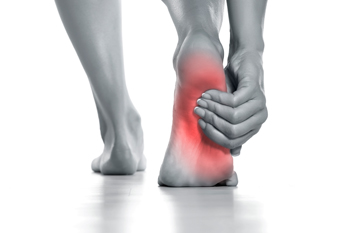Connect With Us
Blog
Items filtered by date: February 2024
Stiffness in Child’s Foot and Tarsal Coalition
 Tarsal coalition, the abnormal growth of the tarsal bones in the foot, is generally discovered in children when their bones mature in adolescence. Symptoms include persistent foot or ankle pain, often on the outer side, along with stiffness and restricted range of motion. Children may complain of discomfort during physical activities or sports. Some children develop changes in foot structure, such as a flatfoot or a higher arch. About three to five percent of the population has this condition. A podiatrist can do a comprehensive evaluation of the feet to diagnose the problem, including a medical history assessment, and X-ray diagnostics. These measures can show the podiatrist if there are any abnormal bony connections or fusion between tarsal bones. If your child is experiencing stiff or painful feet, it is suggested you schedule an appointment with a podiatrist for a proper diagnosis and treatment options.
Tarsal coalition, the abnormal growth of the tarsal bones in the foot, is generally discovered in children when their bones mature in adolescence. Symptoms include persistent foot or ankle pain, often on the outer side, along with stiffness and restricted range of motion. Children may complain of discomfort during physical activities or sports. Some children develop changes in foot structure, such as a flatfoot or a higher arch. About three to five percent of the population has this condition. A podiatrist can do a comprehensive evaluation of the feet to diagnose the problem, including a medical history assessment, and X-ray diagnostics. These measures can show the podiatrist if there are any abnormal bony connections or fusion between tarsal bones. If your child is experiencing stiff or painful feet, it is suggested you schedule an appointment with a podiatrist for a proper diagnosis and treatment options.
Some foot conditions may require additional professional care. If you have any concerns, contact Michael Tomey, DPM of Cary Foot & Ankle Specialists. Our doctor can provide the care you need to keep you pain-free and on your feet.
Rare Foot Conditions
The majority of foot conditions are common and can be treated by a podiatrist. Standard diagnostic procedures are generally used to identify specific conditions and treatment can be rendered. A podiatrist also treats rare foot conditions which can be difficult to diagnose and may need extra attention and care.
There are many rare foot conditions that can affect children. Some of these can include:
- Freiberg’s disease
- Kohler’s disease
- Maffucci syndrome
Freiberg’s disease - This can be seen as a deterioration and flattening of a metatarsal bone that exists in the ball of the foot. It typically affects pre-teen and teenage girls, but can affect anyone at any age. Symptoms that can accompany this can be swelling, stiffness, and the patient may limp.
Kohler’s disease - This often targets the bone in the arch of the foot and affects younger boys. It can lead to an interruption of the blood supply which ultimately can lead to bone deterioration. The patient may limp or experience tenderness, swelling, and redness.
Maffucci syndrome - This affects the long bones in a child’s foot leading to the development of abnormal bone lesions. They are benign growths and typically develop in early childhood and the bones may be susceptible to breaking.
A podiatrist can properly diagnose and treat all types of rare foot conditions. If your child is affected by any of these symptoms or conditions, please don’t hesitate to call our office so the correct treatment method can begin.
If you have any questions please feel free to contact our office located in Cary, NC . We offer the newest diagnostic tools and technology to treat your foot and ankle needs.
Choosing the Ideal Shoes for Restaurant Employees

Selecting appropriate footwear is essential for restaurant employees who spend long hours on their feet, navigating through bustling environments. The best shoes for restaurant workers offer comfort, durability, and slip-resistant features to ensure safety and support throughout demanding shifts. Non-slip shoes with rubber outsoles provide traction on wet and slippery surfaces commonly found in kitchens and dining areas, reducing the risk of slips and falls. Additionally, shoes with cushioned insoles and arch support help alleviate foot fatigue and minimize discomfort during extended periods of standing and walking. Opting for breathable materials like leather or mesh promotes airflow, keeping feet cool and dry in hot and humid environments. It is helpful to choose shoes with closed toes and sturdy construction to protect against spills, dropped objects, and other workplace hazards. If you work in the restaurant environment and are seeking additional information about specific shoes to buy for your working day, it is suggested that you consult a podiatrist.
While working on the feet, it is important to take the proper care of them. For more information about working on your feet, contact Michael Tomey, DPM from Cary Foot & Ankle Specialists. Our doctor will treat your foot and ankle needs.
Working on Your Feet
Standing on your feet for long periods of time can cause stress and pain in your feet. Your whole body may experience change in terms of posture, back pain, bunions, callouses and or plantar warts. There are ways to avoid these conditions with proper foot care, smart choices and correct posture.
Positive Changes
Negative heeled shoe – Choosing this shoe type places the heel slightly lower than the ball of the foot. These are great for overall foot health. Find shoes that fit you correctly.
Go barefoot – Our feet were not designed to be enclosed for all hours of the day. Try to periodically expose your feet to air.
Eliminate Pain
Foot Exercises – Performing simple exercises, incorporating yoga and doing stretches are beneficial. This will allow increased blood flow to the area and muscles of the foot.
Achilles tendon – Stretching the foot out flat on the floor will relax the calf muscles and tendon. These exercises can be performed almost anywhere. Make sure you add these exercises to your daily regimen.
With a little bit of this information and knowing more about foot health, you will notice changes. Foot stretches and proper footwear will help with pain and prevent further issues.
If you have any questions please feel free to contact our office located in Cary, NC . We offer the newest diagnostic and treatment technologies for all your foot and ankle needs.
Treatment for Charcot-Marie-Tooth Neuropathy and Foot Pain

Charcot-Marie-Tooth, or CMT, is a genetic neuropathy that often results in pain. Approximately 80 percent of CMT patients experience pain, primarily in their feet and hands, which are the areas most affected by CMT. Interestingly, pain severity does not necessarily correlate with neuropathy severity. To manage CMT-related pain, several strategies exist. These can include oral and topical medications, behavioral interventions, and addressing sleep and mood issues. If you have foot neuropathy, it is suggested that you schedule an appointment with a podiatrist who can offer you a tailored approach to treatment.
Neuropathy
Neuropathy can be a potentially serious condition, especially if it is left undiagnosed. If you have any concerns that you may be experiencing nerve loss in your feet, consult with Michael Tomey, DPM from Cary Foot & Ankle Specialists. Our doctor will assess your condition and provide you with quality foot and ankle treatment for neuropathy.
What Is Neuropathy?
Neuropathy is a condition that leads to damage to the nerves in the body. Peripheral neuropathy, or neuropathy that affects your peripheral nervous system, usually occurs in the feet. Neuropathy can be triggered by a number of different causes. Such causes include diabetes, infections, cancers, disorders, and toxic substances.
Symptoms of Neuropathy Include:
- Numbness
- Sensation loss
- Prickling and tingling sensations
- Throbbing, freezing, burning pains
- Muscle weakness
Those with diabetes are at serious risk due to being unable to feel an ulcer on their feet. Diabetics usually also suffer from poor blood circulation. This can lead to the wound not healing, infections occurring, and the limb may have to be amputated.
Treatment
To treat neuropathy in the foot, podiatrists will first diagnose the cause of the neuropathy. Figuring out the underlying cause of the neuropathy will allow the podiatrist to prescribe the best treatment, whether it be caused by diabetes, toxic substance exposure, infection, etc. If the nerve has not died, then it’s possible that sensation may be able to return to the foot.
Pain medication may be issued for pain. Electrical nerve stimulation can be used to stimulate nerves. If the neuropathy is caused from pressure on the nerves, then surgery may be necessary.
If you have any questions, please feel free to contact our office located in Cary, NC . We offer the newest diagnostic and treatment technologies for all your foot care needs.
Gout Pain Can Be Managed
Many Causes of Swollen Ankles

Swelling in the feet and ankles, or edema, can stem from various causes. Among the causes of swollen ankles and feet is an abnormal fluid buildup that may result from high sodium intake. Other factors that cause swelling in the feet and ankles include prolonged periods of sitting or standing, injuries, or underlying medical conditions, such as heart or kidney disease. A genetic predisposition can also contribute to thicker ankles, and may be influenced by obesity or the structural absence of a defined calf muscle. Fluid retention, which is often linked to excessive sodium consumption or impaired sodium regulation in the body, can increase swelling, particularly in individuals with heart disease. Pregnancy commonly leads to swollen ankles and feet due to increased fluid volume and pressure from the growing uterus. Managing swollen ankles involves lifestyle adjustments, such as reducing sodium intake, staying hydrated, maintaining regular physical activity, and seeking medical guidance when necessary. If swelling persists or is accompanied by other symptoms, it is suggested that you schedule an appointment with a podiatrist who can conduct a thorough exam and offer the appropriate treatment options.
Swollen feet can be a sign of an underlying condition. If you have any concerns, contact Michael Tomey, DPM of Cary Foot & Ankle Specialists. Our doctor can provide the care you need to keep you pain-free and on your feet.
Swollen feet are a common ailment among pregnant women and people who stand or sit for extended periods. Aging may increase the possibility of swollen feet and patients who are obese often notice when their feet are swelling too. There may be medical reasons why swollen feet occur:
- Phlebitis - A condition that causes the veins to become inflamed and can also cause leg pain.
- Liver disease - This may lead to low blood levels of albumin which is a protein. This can cause fluid in the blood to pass into the tissues and several areas of the body can become swollen.
- Heart failure - When the heart doesn’t pump properly the blood that is normally pumped back to the heart can pool in the veins of the legs causing swollen feet.
- Kidney disease - One of the main functions of the kidneys is releasing excess fluid in the body. This type of condition can make it difficult for the kidneys to function properly, and as a result the feet may become swollen.
- Deep-vein thrombosis (DVT)- This is a serious condition where blood clots form in the veins of the legs. They can block the return of blood from the legs to the heart which may cause the feet to swell. It is important to be treated by a podiatrist if this condition is present.
Swollen feet can also be caused by bone and tendon conditions, including fractures, arthritis, and tendinitis. Additionally, there may be skin and toenail conditions and an infection may cause the feet to swell. Patients who take medicine to treat high blood pressure may be prone to getting swollen feet.
Many patients elevate their feet to help relieve the swelling and this is generally a temporary remedy. When a podiatrist is consulted the reason behind the swelling can be uncovered and subsequently treated.
If you have any questions please feel free to contact our office located in Cary, NC . We offer the newest diagnostic tools and technology to treat your foot and ankle needs.

